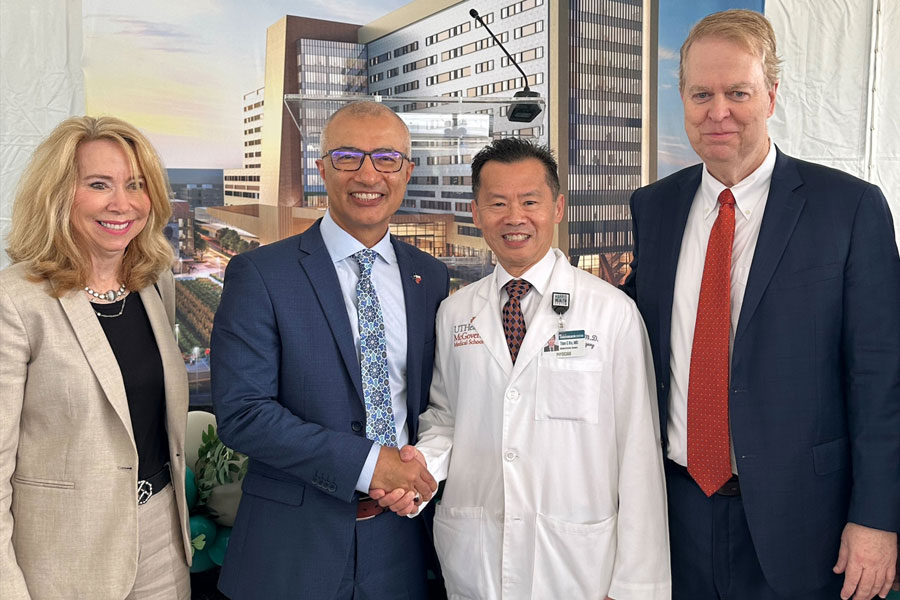Harris Health breaks ground on new hospital project on LBJ campus

UTHealth Houston celebrated alongside its hospital partner as Harris Health System broke ground for a new $1.6 billion hospital on the Lyndon B. Johnson campus in Northeast Harris County that will enhance health care in one of the county’s most vulnerable communities.
The groundbreaking event, held Thursday, May 9, signaled that construction is officially underway on a new 12-story, Level I trauma-capable facility on the current campus of Harris Health LBJ Hospital. The hospital will have 390 private patient rooms, with the potential to expand to 450.
“Since 1990, the beginning of UTHealth Houston’s affiliation with Harris Health, literally thousands of our physicians, residents, and fellows have provided excellent health care to our shared patients in Northeast Houston,” said Kevin Dillon, senior executive vice president and chief operating officer at UTHealth Houston, who was one of the invited speakers at the event. “Harris Health and UTHealth Houston share a commitment not only to improve patient outcomes but also to address the social determinants of health. We join the entire Houston community in our enthusiastic support for this upcoming expansion of the LBJ campus, and we look forward to providing more new services in the coming years.”
Operated by Harris Health System, the facility will become the third adult Level I trauma hospital in Harris County — and the first outside of the Texas Medical Center.
“To say that today is a pivotal moment in the history of Harris Health System, and in reality for the entire Harris County, is a dramatic understatement,” said Esmaeil Porsa, MD, MBA, MPH, president and chief executive officer of Harris Health System. “Today is the start of promises that were made by Harris Health System — to our community, to our patients, to our employees and medical staff.” Porsa completed his internship and residency training in internal medicine at what is now called McGovern Medical School and received a Master of Public Health degree in epidemiology at UTHealth Houston School of Public Health.
“You all are a beacon of light to the community, to those who are most in need and have nowhere else to go,” said Tien Ko, MD, professor of surgery at UTHealth Houston and chief of staff for the hospital, at a celebration for hospital staff.
Harris Health System was founded in 1966 as a safety net hospital system to provide care to residents of Harris County who would otherwise be left without access to health care. “Whether they have gallbladder disease, fractures, or strokes, patients just come to us because we are it. We are it in this whole area,” Ko said.
The project is funded by a $2.5 billion bond referendum approved by Harris County voters in November 2023. Harris Health intends to raise an additional $100 million in philanthropic support and $300 million from operational savings to help offset the total $2.9 billion strategic capital improvement plan.
In addition to the new hospital project, bond funds will ensure the safety-net hospital system can continue to serve those most in need. Funds are allocated to add new community-based clinics in high-need areas and provide necessary improvements to Harris Health Ben Taub Hospital to extend its life span.
The American College of Surgeons recommends having one high-level trauma center for every 1 million people, making the proposed Level I trauma center a critical addition to the county’s health care infrastructure.
Harris County currently has two adult Level I trauma centers, serving a population of almost 4.8 million. Houston is the second fastest-growing major metropolitan area in the United States, with Harris County projected to have over 6 million residents, with more than 1.5 million of them uninsured, by 2050.